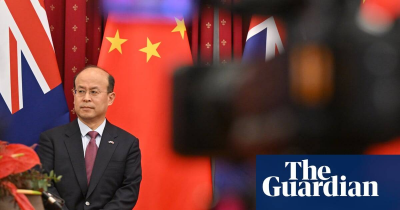The Guardian - China-China lodges protests at Australias response to Taiwans presidential election
January 17, 2024 5 min 935 words
这篇报道揭示了中澳关系中敏感议题的紧张局势。中国驻澳大利亚大使肖谦表示,澳方祝贺台湾总统选举获胜引发中国外交抗议,强调在涉及“敏感”问题上“绝无余地”可妥协。对澳方对人权问题的担忧,特别是被指控间谍罪的澳洲作家杨恒均的释放前景,肖谦则给出悲观评估。他否认中国军舰在日本经济专属区内对澳水兵进行危险声纳脉冲的指控,强调澳方需查明真相。报道反映了中澳在台湾问题、人权和安全事务上的分歧,突显两国关系的复杂性和当前的紧张氛围。这也提示了中澳在处理敏感问题上的困难,以及在外交领域需要更多的沟通和理解。
China has lodged diplomatic protests with Australia for congratulating the winner of Taiwan’s presidential election, with the Chinese ambassador warning there is “no room at all” for compromise on the “sensitive” issue.
China’s top envoy in Australia, Xiao Qian, also dashed hopes that the Australian writer Dr Yang Hengjun might be released from custody in a similar manner to the Australian journalist Cheng Lei last year.
The ambassador further denied that a Chinese warship had subjected Australian naval divers to dangerous sonar pulses in an incident in Japan’s exclusive economic zone in November. He suggested that a Japanese boat was also in the area but did not make any direct accusation against Japan.
Xiao made the comments during a two-hour-long press conference held at the Chinese embassy in Canberra on Wednesday.
Taiwan was a recurring topic after Saturday’s presidential election and Nauru’s decision on Monday to sever diplomatic relations with the self-governed island that China claims as its own.
Xiao confirmed China had complained about a media release posted on the Department of Foreign Affairs and Trade website that said Australia “congratulates Dr Lai Ching-te on his victory in the Taiwan elections held on 13 January”.
The Dfat statement also offered congratulations to “the people of Taiwan on the peaceful exercise of their democratic rights”.
Xiao said China was willing to be flexible in many areas in the relationship with Australia, including to resolve trade disputes, but the issue of Taiwan was particularly “sensitive”.
“On the question of Taiwan, there is no room at all for us to show flexibility or to make compromise,” he said.
“I can share within you that through diplomatic channels, we have been communicating with the Australian side; we have made serious representations that we are strongly opposed to such a statement, a statement by a government on China’s local provincial elections.”
Xiao reiterated Beijing’s position that Taiwan was a matter of “China’s internal affairs” and “involves China’s core interests” so “external forces” should not interfere.
Beijing has repeatedly refused to rule out taking Taiwan by force, while the Australian government’s longstanding position is to oppose “any unilateral change to the status quo across the Taiwan Strait”.
Xiao also offered the most gloomy public assessment by a Chinese official to date on the prospects for release of Yang, an Australian writer and avowed democracy activist who was detained in China in January 2019 and charged with espionage later that year.
after newsletter promotion
Xiao argued Yang’s case was “different in nature” from the case of Cheng, who was released late last year. “To be honest, I cannot expect that the case would come to such a conclusion likewise.”
Yang has previously stated he is “100% innocent of the allegations” and that he “will never confess to something I haven’t done”. His trial was held in May 2021 but he has still not received a verdict, with the court granting multiple three-month extensions on the deadline for handing down a decision.
Yang told supporters last year he was in pain from a large cyst on his kidney and feared dying in Chinese custody.
On Wednesday, Xiao confirmed Yang had “some health problems” but argued “these health problems are not as serious as has been publicly described by his family members”.
Pressed on why China would not just deport Yang to solve a lingering obstacle in the Australia-China relationship, Xiao said the case was “still in the legal process” and “we need to respect [that] and be a bit patient on this issue”.
Xiao was also asked about an incident in mid-November that the Australian government described as an “unsafe and unprofessional” interaction with a Chinese destroyer.
The defence minister, Richard Marles, had said that HMAS Toowoomba had stopped to clear fishing nets entangled around its propellers when a Chinese vessel “was detected operating its hull-mounted sonar in a manner that posed a risk to the safety of the Australian divers who were forced to exit the water”.
Marles said medical assessments had found the divers had “sustained minor injuries likely due to being subjected to the sonar pulses from the Chinese destroyer”.
Xiao said on Wednesday he had “double-checked” with defence colleagues in Beijing and they had told him the Chinese naval vessel “didn’t initiate the so-called sonar against the divers from the Australian side”.
“And at that moment, there was a third country boat nearby,” he said, naming Japan. “Whether or not there was sonar from the other side, other party, we’re not sure. Perhaps our Australian colleagues can find out really what’s the truth.”
A spokesperson for the acting defence minister, Pat Conroy, said: “The Australian Government conveyed to the Chinese Government our serious concerns and we stand by our position regarding the unsafe and unprofessional conduct by the People’s Liberation Army – Navy towards HMAS Toowoomba in November.”
The prime minister, Anthony Albanese, who travelled to Shanghai and Beijing in November as part of the ongoing push to “stabilise” the relationship with Australia’s largest trading partner, said his government would continue to cooperate with China where it could and “disagree where we must”.
China is due to make a decision by March on whether to remove tariffs on Australian wine.

